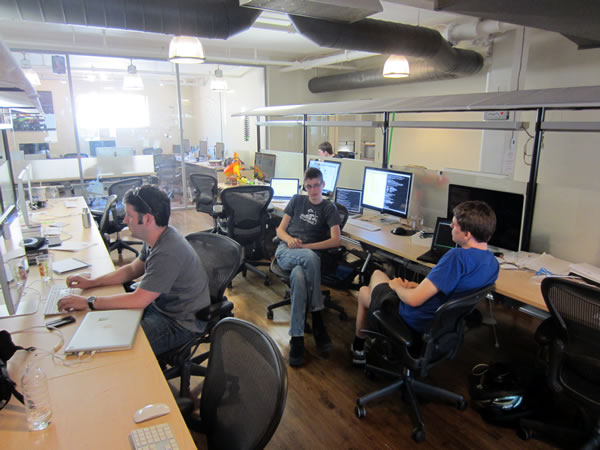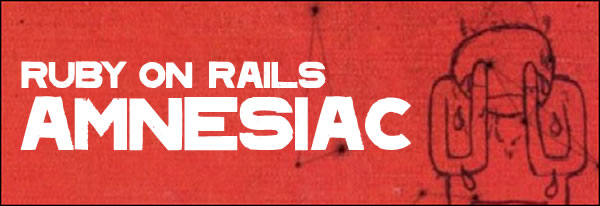
“If you’re havin’ math problems, I feel bad for you, son / I got ninety-nine problems but logic ain’t one.”
This article also appears in The Adventures of Accordion Guy in the 21st Century.

“If you’re havin’ math problems, I feel bad for you, son / I got ninety-nine problems but logic ain’t one.”
This article also appears in The Adventures of Accordion Guy in the 21st Century.

Between the gorgeous day outside and my last-minute announcement of the Rails 3.1 Hackfest, it’s a little bit quiet at the Shopify office right now, but we’re all happily working away.
The Hackfest is a worldwide effort to help improve the upcoming Rails 3.1 before its general release. The call was put out on the Ruby on Rails official blog for participation of all kinds, from working on bug fixes and tests to checking 3.1 for compatibility with existing applications and gems to writing documentation and blog to just learning about Rails.

A bit under four years ago, I made a living writing Rails code. Although the project I worked on was a complete disaster — a poorly-thought-out idea being hammered out at a company run by a trust fund kid in love with the idea of running a startup but not the actual work involved — I learned a lot about coding in Ruby and Rails from the experience. But that was a good number of versions of Rails ago, back before Merb was rolled into the project. Between my time at Microsoft, where I was working pretty exclusively with Microsoft technologies and using Ruby only for little scripting tasks and the time that’s passed, I have become a Rails amnesiac. Hence my Hackfest activity: relearning Rails.
Of all the books covering Rails 3, Michael Hartl’s Ruby on Rails 3 Tutorial is running away with the highest rating on Amazon as well as on other book review sites. Small wonder: it’s well-written and covers a lot of aspects of Rails development, from the core Rails stuff all the way to things like using Git for version control, test-first development and deployment to Heroku. It’s the book I’m using to relearn Rails, and so far, it’s been nothing but great.
Over at the Shopify Technology Blog, I’ve got a long — but easy-to-read-and-follow article covering the setup for writing Shopify apps. If you’re looking to make some money and want a dedicated group of customers, the 16,000 or so Shopify shopowners are a great market to target and the Shopify ecommerce platform is a great one to build on. Check it out: Developing Shopify Apps, Part 1: The Setup.

This comes from a collection on David Hilley’s site, and the creator of these posters is Nick Black.
Previously: Only YOU Can Prevent Buffer Overflows!

This comes from a collection on David Hilley’s site, and the creator of these posters is Nick Black.
Want to help make the upcoming Rails 3.1 better? You can help in this upcoming weekend’s worldwide Rails 3.1 hackfest. It’s your chance to take Rails 3.1. for a spin, double-check to see if your favourite plugins and gems work with 3.1, review the open issues and pull requests, provide test cases and patches for 3-1-stable blockers, write docs and blog about your experience with Rails 3.1. Go check out this blog entry on the Ruby on Rails blog and find out where the one nearest you is.
If you’re a Rails hacker and in Ottawa this Sunday, you’re in luck: we just declared a Rails 3.1 Hack Day for this Sunday, July 24th at the Shopify office.
The ALT.NET community is an interesting one: they’re .NET developers who reach outside the standard Microsoft-proscribed way of doing things and borrow from the best of other developer communities and emphasize technique over tools. Vancouver’s ALT.NET group is holding a “Hack on Some Open Source!” night on Monday, July 25th at iQmetrix’s office; if you’re looking to hack on some open source and C# stuff, this is your chance!
Both hacks (that’s an old-school term for “journalists”) and hackers (a term often misused to refer to people who like to break into systems, but actually means people who love taking things apart, seeing how they work and improving them) are seekers of truth, and in today’s world of information, it only makes sense that the two should meet up. The Toronto chapter of Hacks/Hackers is having a meetup on Tuesday, July 26th and they’re looking for a space. Anyone want to help?
It’s the event of the summer for Ottawa-area Node.js and JavaScript hackers! On Wednesday, July 27th, we’ll gather together at Mercury Grove and have some presentations, including:
The Toronto JavaScript Hackers Meetup group is having a hack night on Tuesday, August 9th. If you’d like to patch and release open source libraries, put your heads together and fix bugs, this is your chance!
Have you ever wanted to crunch some big data? Hack/Reduce 4 in Ottawa, which happens on Saturday, August 13th, would like to give you that opportunity. They’ll provide the datasets (and you can get an advance look at them, too) and you propose writing an application that makes use of that data.
The GROW conference (August 17th through 19th in beautiful Vangroovy) is where Silicon Valley people hang out with Canadian start-up “suits” and talk entrepreneurship. If you’ve got some “suit” in your role, you might want to check it out…
HackDays, the cross-Canada hackfest, is coming to Vancouver on Saturday, August 20th! Organized in conjunction with The GROW conference, it’s your chance to build an application in a single day, compete for prizes and have fun. I’ll be there, as will my fellow members of Shopify’s “Apps” team, Edward Ocampo-Gooding and David Underwood.